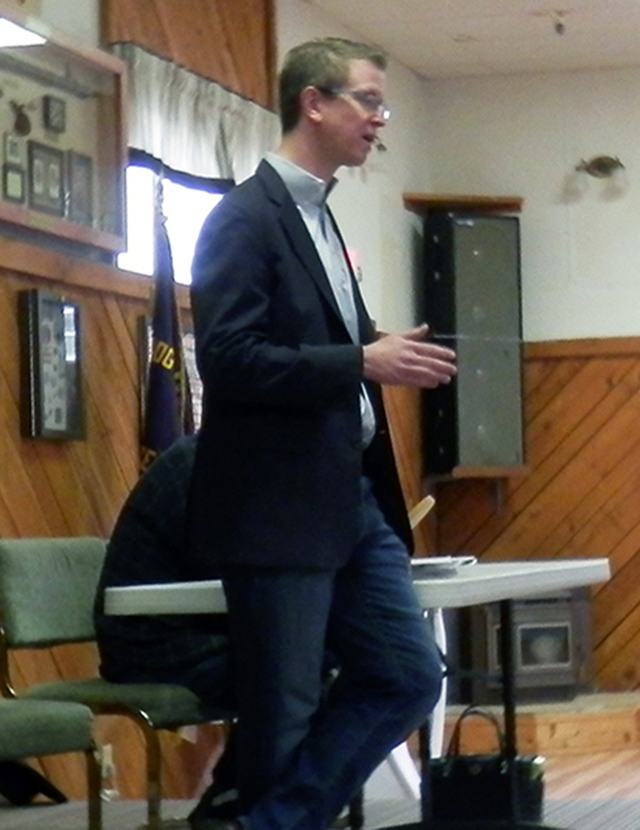Congressman Derek Kilmer visited Ocean Shoes at the very grassroots level last week in a meeting with the group Answers For All, hearing about concerns that ranged from the eroding local coastline, the increasing costs for federal flood insurance, to the future of the Affordable Care Act.
The second-term Democrat (6th District) from Port Angeles brought his experiences in Washington, D.C., back to a series of sessions around Grays Harbor Jan. 25, and he was a special guest for the Ocean Shores citizens group, along with County Commissioner Vickie Raines. The crowd of about 40 people at the Elks Lodge included Mayor Crystal Dingler, and City Council members Jackie Farra and Holly Plackett.
Kilmer’s main message was economic: “We have to get this economy working for everybody,” he said.
“What government does and doesn’t do has a big impact on our ability to grow jobs,” Kilmer said of what inspired him to first run for public office as a “grumpy economic developer.”
Acknowledging that many people have a “repelling” view of the federal government, he also tried to sound a positive note about what still can be accomplished through his Congressional office.
“I don’t work in economic development professionally any more, but I look at my job and our office as focused on economic development,” Kilmer said. “If you look at how I spend my time in the district, a lot of it is just doing outreach to employers here in our community.”
Kilmer called for better management of the federal forests, setting up a timber collaborative with industry, conservation and local leaders “at the same table looking at how we manage the forests in a responsible way. ” The goal is to increase timber harvest levels and improve forest health, he said, and the effort has led to two pilot projects on the Olympic Peninsula.
Concerning coastal communities, Kilmer noted his office has helped with a needs assessment to determine what the hazards are from storm erosion and coastal resiliency issues, such as ongoing problems near the North Jetty. The report from the noted William D. Ruckelshaus Center is due to come out in draft form later this month, with a final report in the spring.
“The goal here is for the state and federal government to step up and to provide some additional help to local communities to address those sorts of challenges,” Kilmer said.
Without an earmark process now in the federal budget, the process to get funding for such needed projects has become more difficult, he acknowledged. But he also vowed to push for the U.S. Army Corps of Engineers to make it a “priority to get these projects done.”
With a nation divided over the presidential election and a Congress that has likewise been fractured through his first term, Kilmer said success too often gets defined as “trying to make the other party look stupid.” He recently was named the co-chair of a group of 24 lawmakers (12 Republicans and 12 Democrats) known as the “Bipartisan Working Group.”
“I think we have seen way too much bickering in our nation’s capital and not enough progress,” Kilmer said. “I have no appetite for that bickering, I just want to see us get stuff done, because I represent a district where we have lots of things that need to get done.”
Finding common ground is constant message in Kilmer’s approach, which is one of the reasons he visited with AFA before heading into Hoquiam for a meeting on Grays Harbor flood issues.
One of his first questions was about changes in flood maps and the increase costs and need for flood insurance.
“Part of the reason you have seen a big spike in flood insurance is because of Congress,” Kilmer said. “… They made a dramatic change in the federal flood insurance program that severely reduced federal support for those whose properties fall in the floodplain. It was movement away from federal support and toward a more market-oriented approach.”
Kilmer sponsored legislation to lessen the impact and vowed to continue to raise the issue: “If you are a coastal community, you absolutely understand why this is a problem.”
Kilmer was asked about the cost of prescription drugs — which he said was “an enormous problem.”
“We have to do something about it,” he said. “There are all sorts of ideas that are floating around our nation’s capital, such as the notion of being able to purchase across the borders. If there is adequate safety, then maybe that is a legitimate way to do it.”
On the Affordable Care Act, Kilmer noted the number of positive impacts it has had in helping those who previously were denied coverage because of pre-existing conditions, or in insuring those who otherwise would not have had any medical coverage.
“Those are very important consumer protections for the folks I represent,” Kilmer said. While he doesn’t think “it was a perfect law,” he has proposed some changes, such as providing assistant to more small businesses to insure their employees through tax code relief measures. Another move would be to bolster primary care provider opportunities in rural areas.
“I think the unfortunate dynamic that you have seen in our nation’s capital is on one hand you have folks treat it like it was a law written on stone tablets and handed down from God; and you have other folks who say, ‘Let’s repeal the whole thing’ without a plan for replacing it,” Kilmer said.



